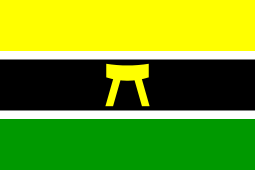Asante dialect
| Asante | |
|---|---|
| Ashanti | |
| Native to | Ashanti |
| Ethnicity | Ashanti people |
Native speakers | 2.8 million[1][2] (2015)[1][2][3] |
| Official status | |
| Regulated by | Akan Orthography Committee |
| Language codes | |
| ISO 639-3 | – |
| Glottolog |
asan1239[4] |
| IETF |
tw-asante[5][6] |
Ashanti, Asante, or Asante Twi, is spoken by over 2.8 million Ashanti people.[7][8] Ashanti (or Ashanti Twi) is one of three literary dialects of the Akan language of West Africa, and the prestige dialect of that language.[9] It is spoken in and around Kumasi, the capital of the Ashanti Region of Ghana.
The two dialects of Akuapem and Asante are known as Twi and are to be mutually intelligible. There are about 9 million Twi speakers, mainly in Ashanti.[1][2] Akuapem Twi was the first dialect to be used for Bible translation, and became the prestige dialect as a result.[10]
In Ethnologue and ISO 639-3, Asante is analysed as a dialect of Twi. Twi in its turn is a language belonging to the macrolanguage of Akan. In Glottolog, Asante is found as a sub-dialect of Twi,[4] which is in turn classified as a dialect of the Akan language.[11]
References
- 1 2 3 "Ashanti » Ashanti Twi (Less Commonly Taught Languages)". University of Michigan College of Literature, Science, and the Arts. University of Michigan.
- 1 2 3 "Ashanti » Ashanti Twi". ofm-tv.com.
- ↑ Akan at Ethnologue (18th ed., 2015)
- 1 2 Hammarström, Harald; Forkel, Robert; Haspelmath, Martin, eds. (2017). "Asante". Glottolog 3.0. Jena, Germany: Max Planck Institute for the Science of Human History.
- ↑ "Language Subtag Registry". Internet Assigned Numbers Authority (IANA). Retrieved 2017-06-12.
- ↑ "Language Subtag Registration Form for 'asante'". Internet Assigned Numbers Authority (IANA). Retrieved 2017-06-12.
- ↑ "Akan". Ethnolouge.
- ↑ "Ashanti » Ashanti Twi". ofm-tv.com.
- ↑ "Akan (Twi) at Rutgers". Rutgers.edu. Retrieved 12 July 2017.
- ↑ "Twi". Omniglot. Retrieved 10 March 2015.
- ↑ Hammarström, Harald; Forkel, Robert; Haspelmath, Martin, eds. (2017). "Twi". Glottolog 3.0. Jena, Germany: Max Planck Institute for the Science of Human History.
